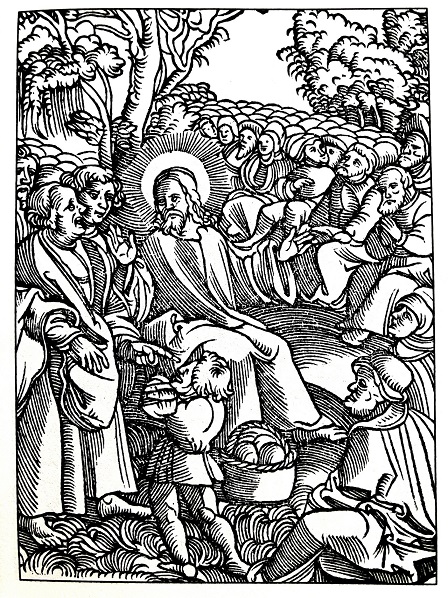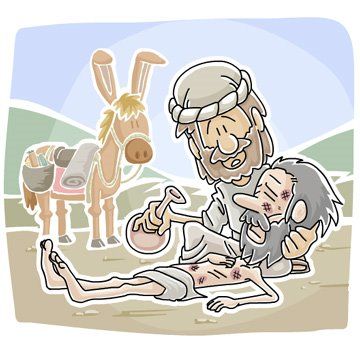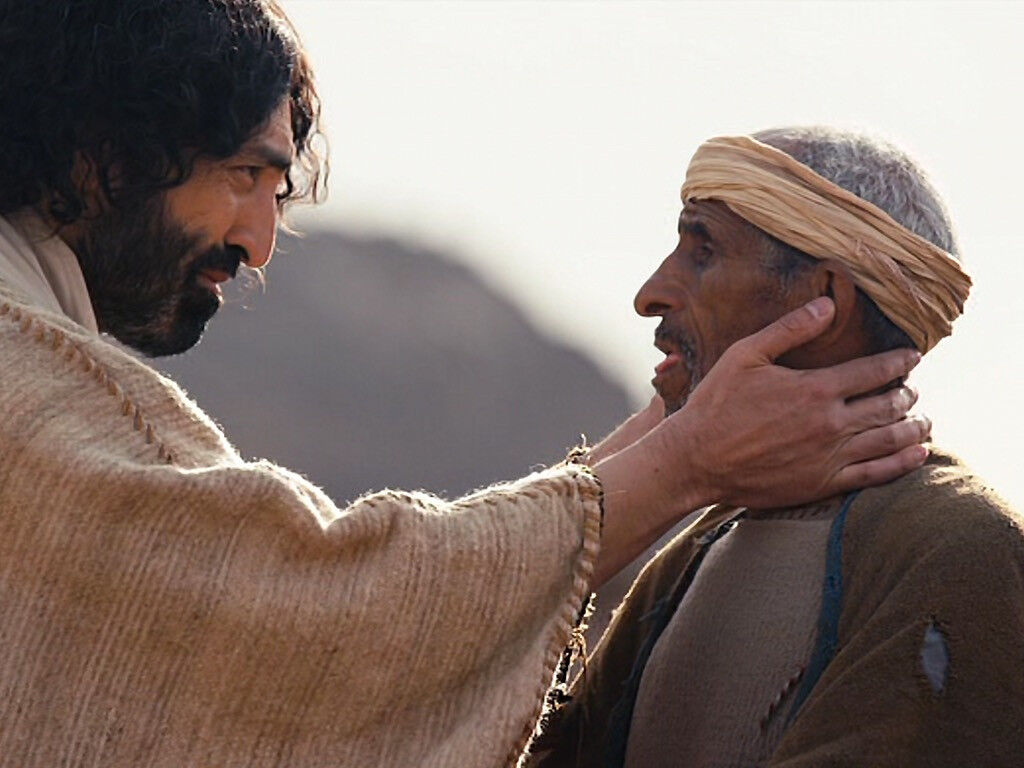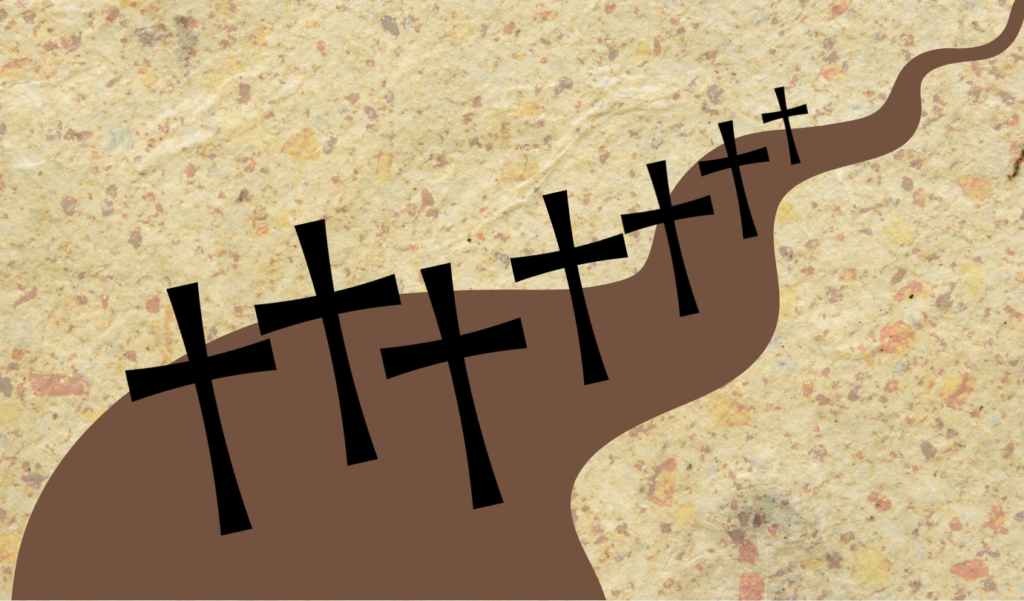Readings: 1 Kings 17:8-16 | Galatians 5:25-6:10 | Matthew 6:24-34
Text: Matthew 6:24-34
Why do you suppose the Bible so often speaks of God providing for His people in times of wilderness, drought, and famine? Abraham and Isaac were kept alive in famine. Joseph went ahead into Egypt so that many would be kept alive according to God’s plan. The sons of Israel were richly supplied in the wilderness with water, manna, and quail. Ruth and Boaz, Gideon, this widow at Zarephath in the Old Testament lesson (1 Kings 17:8-16). It seems like God is always showing Himself in times of great need.

There is a rational side of us that recognizes that labor goes into producing the things we need for this life. There is a just result of labor in this ordered world. Hard work yields a product. Good choices result in good outcomes. By God’s grace, that is the great majority of the time. But there are also times when it doesn’t work—droughts, floods, pestilence.
The effects of the fall are also like a shroud cast over the world: “the creation was subjected to futility, not willingly, but because of him who subjected it, in hope that the creation itself will be set free from its bondage to corruption” (Rom. 8:20-21) and “all our days pass away under your wrath; we bring our years to an end like a sigh. The years of our life are seventy, or even by reason of strength eighty; yet their span is but toil and trouble; they are soon gone, and we fly away.” (Ps. 90:9-10)
While that rational part of us understands the order of the world, there is also a part of us that fails to acknowledge that the toil and fruitlessness of labor is the consequence of sin—our sin and the bondage of the world. “By the sweat of your face you shall eat bread, till you return to the ground, for out of it you were taken; for you are dust, and to dust you shall return.” (Genesis 3:19)
Our wrong-headed sinful response to this is to say God is treating us unfairly. How dare He cause us to suffer hunger! Doesn’t he know the drought by which he was punishing Ahab was about the kill the widow at Zarephath and her son? “And now I am gathering a couple of sticks that I may go in and prepare it for myself and my son, that we may eat it and die.” (1 Kings 17:12) That would be a valid argument if we actually deserved better.
What God provides or does not provide is based on His loving Fatherly wisdom. “Shall we receive good from God, and shall we not receive evil?” faithful Job asks (Job 2:10) God uses even privation to do His work. He uses droughts and famines. He even uses 9.1% inflation[1] to do His good and gracious will. And what is His will? Not just to keep us full, healthy, and happy. That’s what our sinful nature lusts after. Those are the bestial desires of animals, and they completely ignore the soul.

He has a higher purpose for us human beings, created in His image and likeness, of whom He desires to give His kingdom which has no end. The privation is part of His eternal training of His children so that our faith would not be in the daily bread but in Our Father who Art in Heaven.
By taking away our “creature comforts” for a time, our heavenly Father is wanting us to wake up and repent of how we’ve been devoted to those things. And that is His will for us, who are His children. He desires that we persevere in His Word and have true fellowship with Him, that we live this life in faith toward him. He wants our hearts set on Him, who gives every good and necessary thing.
Anyone who has raised any kind of livestock or cared for a pet knows that there are certain instructions for how to care for this creature. The needs of a turtle are different from a puppy, and the care for a cow differs from a pig. Well, our Father who made us knows what care is necessary for us to thrive. This is what our Lord means when He says, “I came that they may have life and have it abundantly.” (John 10:10) This abundant life includes a healthy soul, at peace with God, living before our neighbors in right vocations, keeping the Word of God in our hearts and “as the eyes of servants look to the hand of their master, as the eyes of a maidservant to the hand of her mistress, so our eyes look to the Lord our God, till he has mercy upon us.” (Psalm 123:2)
Because He knows that we are rational beings according to His image (corrupted as that may be), He appeals to us in this way:
Look at the birds of the air: they neither sow nor reap nor gather into barns, and yet your heavenly Father feeds them. Are you not of more value than they? 27 And which of you by being anxious can add a single hour to his span of life?
Consider the lilies of the field, how they grow: they neither toil nor spin, 29 yet I tell you, even Solomon in all his glory was not arrayed like one of these. 30 But if God so clothes the grass of the field, which today is alive and tomorrow is thrown into the oven, will he not much more clothe you, O you of little faith?

Have you ever seen a bird worried about the weather? Has a crane fly ever worried itself to death over the fact it only lives a few days? And did it detract from the beauty of our gardens in spring that they become our fall burn piles? The birds and the lilies are God’s messengers to us to repent of all our anxious bustling. Plenty of money, a fully stocked pantry, and a plan for every disastrous scenario cannot and will not save you. Only your God can do that!
What a good reminder, pastor! Now everything is clear! If only it were a matter of being reoriented once. But we continually struggle against such temptations, between loving God and hating Mammon, or hating God and loving Mammon. This is the sinful flesh God’s Spirit in us fights against (Gal. 5:17) that is with us until we breathe our last bit of poisoned air in this life.
“O you of little faith” our Lord calls us. We need more than a rational argument to think rightly about our life from God. We need God’s mercy. We constantly need His forgiveness. Even King David prayed in Psalm 119:109, “I hold my life in my hand continually, but I do not forget your law.” And knowing this specific need of ours, He also richly provides that mercy. Right after teaching us to pray, “Give us this day our daily bread,” He bids us to ask, “Forgive us our trespasses as we forgive those who trespass against us.”
Sometimes a person will ask why Christians, specifically Lutherans, focus so much on the forgiveness of sins? As a follow up to that, they might wonder if I’ve been forgiven in the beginning of service, then why do I need the Lord’s Supper? And it’s got to get really desperate before I’ll ask to see the pastor for private confession and absolution.
O you of little faith, don’t you see that the ways God pours out His grace are many!
We will now return to the Gospel, which does not give us counsel and aid against sin in only one way. God is superabundantly generous in His grace: First, through the spoken Word, by which the forgiveness of sins is preached in the whole world [Luke 24:45-47]… Second, through Baptism. Third, through the holy Sacrament of the Altar. Fourth, through the Power of the Keys. Also through the mutual consolation of brethren, “Where two or three are gathered” (Matt. 18:20) and other such verses [Rom. 1:12]. (Smalcald Articles, Part III, Article IV)

Our heavenly Father knows we need His grace, applied to us in these manifold ways. So, just as our daily life is adorned with such a variety of daily bread, He provides so many rich ways to receive His pardon and peace: Hearing the Word not just on Sunday, but throughout the week in personal and family devotions. Making the sign of the cross on yourself is a reminder of God’s Name and His promises for you in Baptism. The Bread of Heaven provided for you regularly at this altar. And if that weren’t enough, He has given us the gift of our brothers and sisters in Christ, who share our burdens and the truths of His Kingdom with us.
We need much more than birds and lilies, and our Father in heaven knows all this. But if we look around, we can see how disordered our priorities are. Look at all the riches of our land, the way people spend money they have or don’t have, what dollars are poured into medical advancements. All of these things are of passing worth—rust sets in, moths destroy, thieves break in and steal, death catches up to us. Perhaps God will take it away, as He has in the past, and it won’t matter if it’s in land or cryptocurrency. But if He does, it will be to teach us not to trust in Mammon, in these earthly things. The Word of the Lord endures forever, when every other thing fails.
In such times, remember the widows, the times of drought, the wilderness wandering of Israel. Remember the Lord in all of it. Before we trouble ourselves about anything else, “seek first the kingdom of God and his righteousness, and all these things will be added to you.” In the Name + of Jesus. Amen.

[1] https://moneywise.com/news/economy/inflation-rate



















